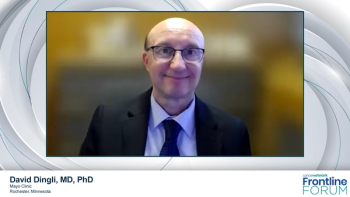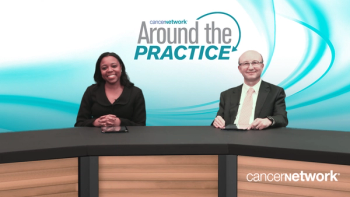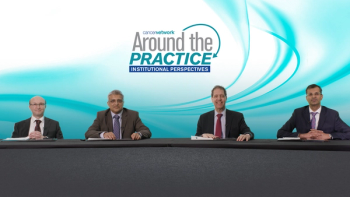Articles by David Dingli, MD, PhD

An expert explains that bispecific antibodies, currently approved for heavily pretreated multiple myeloma patients, are poised for earlier use—including maintenance and frontline settings—with ongoing research focused on safely stopping therapy after sustained minimal residual disease negativity to personalize treatment and improve long-term outcomes.

An expert highlights that outpatient step-up dosing of bispecific antibody therapy in multiple myeloma is feasible and beneficial for selected patients—with criteria like caregiver support, proximity to care, and low disease burden—supported by prophylactic measures and close monitoring to ensure safety while improving patient comfort and reducing health care costs.

An expert explains that while bispecific antibodies show strong efficacy in relapsed/refractory multiple myeloma, optimizing their safety—through step-up dosing, infection prophylaxis, immunoglobulin support, and early symptom management—is essential to minimizing toxicity and expanding access to this promising treatment class.

An expert discusses that combining the bispecific antibodies teclistamab and talquetamab has shown promising efficacy and manageable toxicity in heavily pretreated multiple myeloma patients—including those with extramedullary disease—offering a compelling dual-targeted option for high-risk cases while allowing flexibility in sequencing for slower-progressing disease.

An expert explains that teclistamab has proven to be a highly effective and well-tolerated therapy for relapsed/refractory multiple myeloma in real-world settings, with outcomes mirroring clinical trials and improved infection management strategies enhancing its safety and accessibility for a broader range of patients.

An expert explains that real-world data from the REALiTEC study shows teclistamab remains highly effective in relapsed/refractory multiple myeloma—even among patients ineligible for clinical trials—demonstrating strong response rates, encouraging survival outcomes, and reinforcing the importance of therapy sequencing and broad access to bispecific antibodies in everyday clinical practice.

Panelists discuss how emerging treatments, digital health tools, and enhanced care coordination could streamline disease management and improve quality of life while identifying opportunities to strengthen provider communication and access to resources.

Panelists discuss how their lived experiences and insights as patients should inform research priorities, treatment development, and care delivery improvements while sharing hopes for a future cure that would eliminate ongoing disease management needs and allow greater life flexibility.

Panelists discuss how they maintain treatment adherence through digital health apps, calendar reminders, and symptom journals while working closely with their care teams to address uncertainties and make informed decisions about therapy adjustments, with crucial support from caregivers who help track appointments and provide emotional encouragement throughout their chronic care journey.

Panelists discuss how they navigated initial treatment confusion by seeking clarification from healthcare providers, consulting patient resources, and connecting with support groups to better understand their care journey.

Panelists discuss how to help patients weigh the risks and benefits of different treatment options for paroxysmal nocturnal hemoglobinuria (PNH), outlining tools and techniques used to ensure that patients and caregivers fully understand their choices and make informed decisions.

Panelists discuss how to help patients weigh the risks and benefits of different treatment options for paroxysmal nocturnal hemoglobinuria (PNH), outlining tools and techniques used to ensure that patients and caregivers fully understand their choices and make informed decisions.

Panelists discuss resources and strategies to help patients and caregivers cope with the initial shock of a paroxysmal nocturnal hemoglobinuria (PNH) diagnosis, emphasizing critical points during the first consultation, and explore how Brandi communicated her treatment preferences to her care team, reflecting on her sense of inclusion in the decision-making process and areas for improvement.

Panelists discuss how Brandi first noticed symptoms leading to her paroxysmal nocturnal hemoglobinuria (PNH) diagnosis, highlighting the challenges of the initial diagnostic process, and explore the impact of fatigue and brain fog on her daily life. They also address how clinicians assess the severity of these symptoms during consultations and what they indicate about disease progression or treatment needs.

Bispecifics and CAR-T Therapies in the Management of Multiple Myeloma
ByShaji Kumar, MD, Mayo Clinic,Morie A. Gertz, MD, MACP, Mayo Clinic,David Dingli, MD, PhD,Prashant Kapoor, MD Broad discussion on novel therapies, including bispecifics and CAR-T therapies, that are evolving the treatment landscape of multiple myeloma.

Selecting and Sequencing Therapy in Relapsed/Refractory MM
ByShaji Kumar, MD, Mayo Clinic,Morie A. Gertz, MD, MACP, Mayo Clinic,David Dingli, MD, PhD,Prashant Kapoor, MD Panelists take a broad look at treatment selection and sequencing through multiple lines of therapy in patients with multiple myeloma.

Case Presentation 3: Managing NDMM in Frail Patients
ByShaji Kumar, MD, Mayo Clinic,Morie A. Gertz, MD, MACP, Mayo Clinic,David Dingli, MD, PhD,Prashant Kapoor, MD Moving to the last patient case of newly diagnosed multiple myeloma, expert panelists work together to define patient frailty in this setting and discuss how frail patients are treated in practice.

Considerations for Incorporating Daratumumab-Containing Regimens in NDMM
ByShaji Kumar, MD, Mayo Clinic,Morie A. Gertz, MD, MACP, Mayo Clinic,David Dingli, MD, PhD,Prashant Kapoor, MD Shared insight on optimizing selection and use of daratumumab-containing regimens in NDMM, with regard for clinical trial readouts in this setting.

Case Presentation 2: Transplant-Ineligible NDMM and Treatment With the DRd Regimen
ByShaji Kumar, MD, Mayo Clinic,Morie A. Gertz, MD, MACP, Mayo Clinic,David Dingli, MD, PhD,Prashant Kapoor, MD Experts review a second patient case wherein transplant-ineligible newly diagnosed multiple myeloma was treated with the daratumumab, lenalidomide and dexamethasone regimen and how updated data from the MAIA trial can be incorporated into clinical practice.

Role for Transplantation and Maintenance Therapy in NDMM
ByShaji Kumar, MD, Mayo Clinic,Morie A. Gertz, MD, MACP, Mayo Clinic,David Dingli, MD, PhD,Prashant Kapoor, MD Considerations for assessing eligibility of patients for transplantation for NDMM and how maintenance therapy may be initiated in the post-transplant setting.

Case Presentation 1: Selecting Therapy in Transplant-Ineligible NDMM
ByShaji Kumar, MD, Mayo Clinic,Morie A. Gertz, MD, MACP, Mayo Clinic,David Dingli, MD, PhD,Prashant Kapoor, MD Centering discussion on a patient case of transplant-ineligible newly diagnosed multiple myeloma, experts consider how they would approach workup and management.

NDMM Management: Assessing Response and Determining Duration of Therapy
ByShaji Kumar, MD, Mayo Clinic,Morie A. Gertz, MD, MACP, Mayo Clinic,David Dingli, MD, PhD,Prashant Kapoor, MD Comprehensive insight on optimizing newly diagnosed multiple myeloma management, ranging from response assessment to use of consolidation and maintenance therapy.

Frontline Quadruplet Therapy in NDMM: GMMG-HD7
ByShaji Kumar, MD, Mayo Clinic,Morie A. Gertz, MD, MACP, Mayo Clinic,David Dingli, MD, PhD,Prashant Kapoor, MD Shared insight on the GMMG-HD7 study, which utilized a frontline isatuximab-containing quadruplet regimen in patients with newly diagnosed multiple myeloma.

Frontline Quadruplet Therapy in NDMM: GRIFFIN and MASTER Studies
ByShaji Kumar, MD, Mayo Clinic,Morie A. Gertz, MD, MACP, Mayo Clinic,David Dingli, MD, PhD,Prashant Kapoor, MD Expert perspectives on frontline daratumumab-containing quadruplet regimens in the context of recent clinical trials in newly diagnosed multiple myeloma.

Developments in the understanding of multiple myeloma biology have revolutionized our approach to therapy, leading to meaningful improvements in survival.[1] It is becoming increasingly clear that like all tumors, myeloma is a heterogeneous disorder, with different cytogenetic abnormalities, disease kinetics, response to therapy, and prognosis.[2,3] Therefore, a “one size fits all” approach to therapy is no longer tenable for this disease.[4,5] In parallel with this novel understanding of disease biology has been the discovery of novel classes of agents such as the immunomodulatory agents (IMiDs)[6,7] and proteasome inhibitors (eg, bortezomib [Velcade])[8] that alone have significant activity against the disease and more so when used in combination with other agents.





